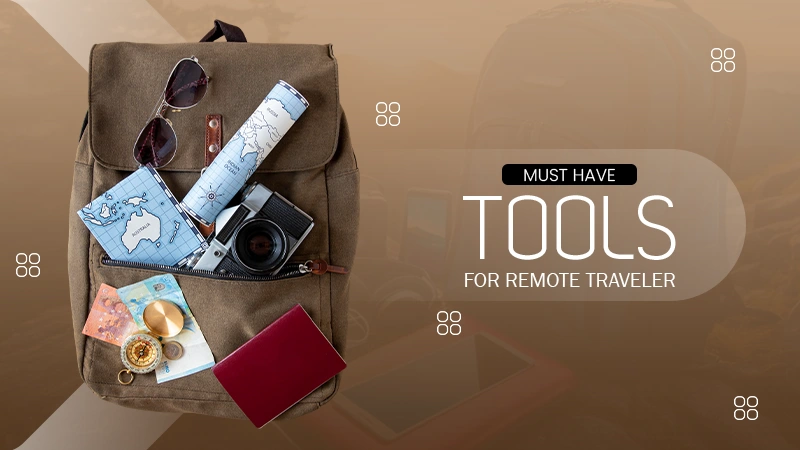
The environment of remote work and digital nomadism has exploded beyond all expectations. By 2025, over 50 million Americans work remotely, while the global digital nomad population has reached 12.5 million people, a 400% increase from pre-pandemic levels. This massive shift has created an entirely new category of travelers who need to maintain productivity, security, and connectivity while exploring the world.
Modern remote travelers face unique challenges that traditional tourists never encountered. From securing public WiFi connections in Bangkok cafes to accessing geo-restricted work platforms from Buenos Aires, remote workers spend an average of $5,000 annually on travel technology and productivity tools. The right technological arsenal can mean the difference between a successful remote work adventure and a connectivity nightmare that derails both travel plans and career progress.
Whether you’re a seasoned digital nomad or planning your first remote work adventure, these seven essential tools will keep you productive, secure, and connected no matter where your journey takes you.
How to Choose the Right Tools for your Travel Style
Budget Considerations
Initial investment in quality tools typically ranges from $1,500-3,000, but this expense should be viewed as business infrastructure rather than travel costs. These tools directly impact earning potential and work quality.
Cost-Benefit Analysis:
- High-quality tools last longer and perform better in challenging conditions
- Reliable equipment prevents costly work delays and missed opportunities
- Professional-grade tools often include warranties and support services essential for remote workers
Destination-Specific Needs
Different regions present unique challenges that may require specialized tools or configurations:
Developing Countries: Prioritize offline capabilities and backup power solutions
High-Censorship Regions: Focus on VPN reliability and communication alternatives
Remote Locations: Emphasize satellite connectivity and extended battery life
Integration and Compatibility
The most successful remote travel setups feature tools that work seamlessly together. Before investing, ensure your chosen tools integrate properly and don’t create workflow friction.
7 Essential Tools for the Modern Remote Traveler
We highlighted the seven essential tools every remote traveler needs in the modern era. Whether for seamless video calls on a Thai beach, safeguarding data in a busy airport, or keeping your devices powered up in rural Peru, these are the solutions that smart travelers rely on for success and peace of mind.
1. Cloud Storage and Backup Solution
Never Lose Important Work Again
Remote travelers face constant risks of device loss, theft, or damage. Cloud storage isn’t just convenient, it’s essential insurance for your digital livelihood.
Essential Features to Look For:
- Automatic synchronization across all devices
- Offline access for files when internet is unreliable
- Version history to recover from accidental changes
- Collaborative sharing for team projects
Top Solutions:
Google Drive, Dropbox Business, and OneDrive offer robust solutions, but many remote workers use multiple services for redundancy. The key is choosing platforms that work reliably in your target destinations and integrate with your existing workflow.
Pro Tip: Always maintain local backups on external drives for critical files. Internet outages in remote locations can happen, and you need access to essential documents regardless of connectivity.
2. Reliable VPN Service
Why VPNs Are Non-Negotiable for Remote Travelers?
Public WiFi networks in airports, hotels, and cafes represent some of the biggest security risks remote workers face. Without proper protection, your sensitive business data, client information, and personal credentials are exposed to cybercriminals who specifically target these networks.
AstrillVPN stands out as the ideal solution for remote travelers because it addresses the unique challenges of working from anywhere. Unlike consumer-focused VPN services, It’s VPN is built for serious remote work requirements.
Key Benefits for Remote Travelers:
- Military-grade encryption protecting all business communications
- 300+ servers in 57 countries ensuring reliable connections worldwide
- StealthVPN protocol bypassing even the most restrictive firewalls
- Smart Mode routing only essential traffic through VPN for optimal speed
- 24/7 customer support available regardless of your time zone
3. Universal Travel Adapter with USB-C PD
Power Management Across Continents
Modern remote workers carry multiple devices that all require power. A quality universal adapter eliminates the frustration of incompatible outlets and dead devices.
Must-Have Features:
- Universal plug compatibility for 150+ countries
- Multiple USB ports including USB-C Power Delivery
- Fast charging capability for laptops and phones simultaneously
- Compact design that doesn’t dominate luggage space
- Built-in fuses protecting expensive electronics
Why This Matters:
Remote workers report that power management issues cause more productivity loss than internet connectivity problems. The right adapter system keeps all devices operational and eliminates the need to hunt for country-specific adapters.
Investment Range: Quality universal adapters cost $30-80, but they pay for themselves by preventing the need to purchase local adapters in every destination.
4. Portable Hotspot Device
Internet Independence Wherever You Go
Relying solely on local WiFi networks limits your flexibility and productivity. Remote workers with dedicated hotspot devices report 40% higher productivity compared to those dependent on location-based internet.
Key Capabilities:
- Global data plans or local SIM card compatibility
- Long battery life supporting full work days
- Multiple device connections for laptops, phones, and tablets
- Fast data speeds suitable for video calls and large file transfers
Popular Options:
Verizon Jetpack, AT&T MiFi, and Skyroam devices offer different advantages. Many remote workers prefer unlocked devices that accept local SIM cards for better rates and speeds in specific regions.
Cost Considerations: While international data can be expensive, the productivity gains and flexibility often justify the investment. Many remote workers budget $100-300 monthly for reliable mobile internet.
5. Noise-Canceling Headphones
Create Your Office Anywhere
Remote work often happens in noisy environments—busy cafes, airport terminals, or shared accommodations. Quality noise-canceling headphones are essential for maintaining focus and professionalism.
Professional Requirements:
- Active noise cancellation blocking ambient sounds
- High-quality microphone for clear video calls
- Long battery life lasting through international flights
- Comfortable fit for extended wear
- Quick charging for last-minute travel days
Beyond Productivity:
These headphones also enhance your travel experience, making long flights more bearable and helping maintain sleep schedules across time zones.
Top Choices: Sony WH-1000XM5, Bose QuietComfort, and Apple AirPods Max lead the market, with each offering unique advantages for different work styles and budgets.
6. Ergonomic Portable Workspace Setup
Protect Your Health While Traveling
Extended laptop use causes physical strain that accumulates over time. Remote workers who don’t address ergonomics face long-term health issues that can end their travel lifestyle prematurely.
Essential Components:
- Laptop stand elevating screen to eye level
- External keyboard enabling proper arm positioning
- Portable mouse reducing repetitive strain
- Lumbar support cushion for various seating situations
- Blue light glasses reducing eye strain during long work sessions
Compact Solutions:
Modern ergonomic travel accessories are designed for nomadic lifestyles. Foldable laptop stands, roll-up keyboards, and inflatable lumbar supports pack efficiently while providing significant comfort improvements.
Health Investment: The $200-400 investment in ergonomic accessories prevents thousands in potential medical costs and ensures you can maintain your remote work lifestyle long-term.
7. Multi-Device Charging Station
Streamline Your Tech Ecosystem
Remote travelers typically manage 3-5 devices daily: laptop, phone, tablet, headphones, and various accessories. A dedicated charging solution eliminates cable chaos and ensures everything stays powered.
Smart Charging Features:
- Intelligent power distribution optimizing charging speeds
- Compact cable management reducing tangled wire frustration
- International voltage compatibility working worldwide
- Fast charging protocols supporting all major device brands
Organization Benefits:
Beyond charging, these stations serve as device organization hubs, creating consistent setups regardless of accommodation type. This routine helps maintain productivity in unfamiliar environments.
Space Efficiency: Quality charging stations replace multiple individual chargers, actually reducing total luggage while improving functionality.
Conclusion
The modern remote worker’s success depends heavily on having the right technological foundation. These seven essential tools from VPN’s security protection to ergonomic workspace solutions form the backbone of a productive, secure, and sustainable remote work lifestyle.
The investment in quality tools pays dividends through increased productivity, better work quality, and the freedom to work from anywhere without compromising professional standards. As remote work continues evolving, having reliable, professional-grade equipment becomes increasingly important for maintaining competitive advantage.









